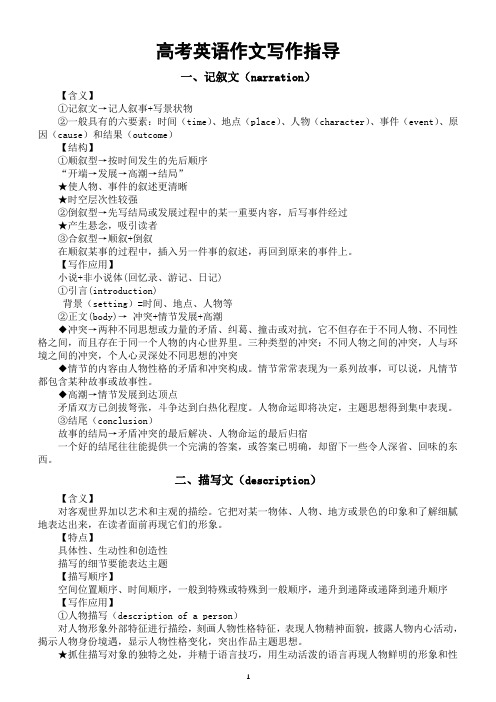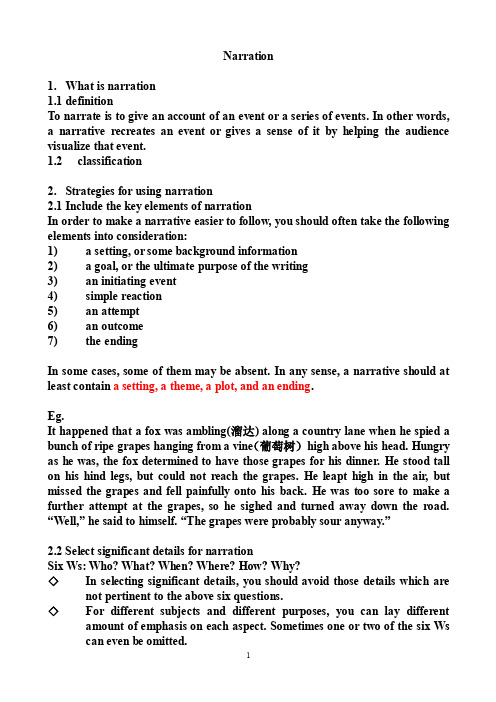narration
Narration 记叙文的写作要点

Expository narrative
is the factual account of events, including history, biography, travels, news reports and journals.
The ways to narrate
in sequence of time顺叙 flashback倒叙 narration interspersed with flashbacks插叙 narration interspersed with comment)夹叙夹议
4 Atmosphere 气氛
The general mood or feeling established in a piece of literature. Atmosphere is created through word choice and pacing .
5 Conflict
• the central problem that drives the action of a story . • Two main types • Internal ---the conflict happens in a character`s mind • External---the conflict happens between characters ,or between a character and some outside force.
6 Point of View 视角
• Who is narrating the story • Two main types • First person---the narrator use “I” to tell the action ,and is involved in the story • Third person---the story is told from a perspective outside the story .The characters are referred to by name ,or as he ,she or they
英语写作Narration

Ⅱ. Five Aspects of Narration
Context (背景) 记叙文的背景包括事件发生的时间、地点、 人物等要素,这些需要在文章的开头交代 清楚,从而为事件的发展提供一个背景环 境,帮助读者更好地理解事件的进程。
Selection of Details (细节的选取)
一个事件总是由大大小小的细节构成的。 细节的选取要适量,如果太少无法使读者 了解整个事件的发生及过程,如果太多又 会使情节显得杂乱从而使读者失去兴趣。 细节的选取应遵循一个原则:即仅选取那 些与主题相关,能够带出中心思想的细节。
We all enjoyed a pleasant time. Most of us swam in the sea. We played and splashed water onto one another. Having swum for a while, we went to the shore and bathed in the sun on the sand ground. Some went boating. They sang as they boated. The others played games at the shore.
按照汉语的写作标准,这样的开头自然而又不俗, 但Houston教授对他的评语是“This is essentially a solid essay. The writer uses an anecdote to make a point…Now we just need to give it a good, strong topic sentence using the writer’s own ideas to form it.”
1. 记叙文又称记事文或叙述文,是按照时间顺序叙 述人物的经历和事情的产生、发展和变化过程的 文章。记叙文主要的叙事方式有顺叙、倒叙、插 叙和夹叙夹议。
3.Narration

Sequence or order
Use the conventions found in any story:
• a plot • the characters • a climax • an ending
10-4
Be sure to include the following information: • why (the plot is important) • who (the characters are) • where (it happened, is happening, will happen) • when (it happened, is happening, will happen) Use flashback to make a narrative interesting.
III. Five Aspects of Narration
• Context (背景) 记叙文的背景包括事件发生的时间、地 点、人物等要素,这些需要在文章的开 头交代清楚,从而为事件的发展提供一 个背景环境,帮助读者更好地理解事件 的进程。
Elements of the Context
• Plot – the arrangement/flow of incidents or events in a story • Character – maybe a person, a group or even animal (who act or think like people) who is/are placed in a situation which contains a problem he/she must solve. • Conflict – the problem in the story which the protagonist should resolve.
Narration.

Six elements of a narrative
• • • • • • Setting Characterization(direct or indirect) Time Cause of event Incident Consequence
When planning a narrative, the writer should consider these five aspects:
• It depends! • 1.When the story is clearly told, the narrative comes to a natural end. there is no need for a concluding paragraph • 2.But sometimes it may be necessary to add one or two paragraphs about the significance of the story or about things that happen afterwards.
Thank you!
• A narrative is made up of details! • Providing enough and only relevant details or things that contribute the main ideas of your narrative. • Bearing in mind the purpose of your narrative when selecting the details
What is the order of narration?
• A narration is 记叙 usually organized in the order in which incidents actually occurred • A flashback is 倒叙 when a short part of a story goes back to events in the past. • Narration interspersed with flashbacks is 插叙 when sometimes the flashbacks and the present alternate through the story.
高中英语高考作文写作指导(记叙文+描写文+说明文+议论文)

高考英语作文写作指导一、记叙文(narration)【含义】①记叙文→记人叙事+写景状物②一般具有的六要素:时间(time)、地点(place)、人物(character)、事件(event)、原因(cause)和结果(outcome)【结构】①顺叙型→按时间发生的先后顺序“开端→发展→高潮→结局”★使人物、事件的叙述更清晰★时空层次性较强②倒叙型→先写结局或发展过程中的某一重要内容,后写事件经过★产生悬念,吸引读者③合叙型→顺叙+倒叙在顺叙某事的过程中,插入另一件事的叙述,再回到原来的事件上。
【写作应用】小说+非小说体(回忆录、游记、日记)①引言(introduction)背景(setting)=时间、地点、人物等②正文(body)→冲突+情节发展+高潮◆冲突→两种不同思想或力量的矛盾、纠葛、撞击或对抗,它不但存在于不同人物、不同性格之间,而且存在于同一个人物的内心世界里。
三种类型的冲突:不同人物之间的冲突,人与环境之间的冲突,个人心灵深处不同思想的冲突◆情节的内容由人物性格的矛盾和冲突构成。
情节常常表现为一系列故事,可以说,凡情节都包含某种故事或故事性。
◆高潮→情节发展到达顶点矛盾双方已剑拔弩张,斗争达到白热化程度。
人物命运即将决定,主题思想得到集中表现。
③结尾(conclusion)故事的结局→矛盾冲突的最后解决、人物命运的最后归宿一个好的结尾往往能提供一个完满的答案,或答案已明确,却留下一些令人深省、回味的东西。
二、描写文(description)【含义】对客观世界加以艺术和主观的描绘。
它把对某一物体、人物、地方或景色的印象和了解细腻地表达出来,在读者面前再现它们的形象。
【特点】具体性、生动性和创造性描写的细节要能表达主题【描写顺序】空间位置顺序、时间顺序,一般到特殊或特殊到一般顺序,递升到递降或递降到递升顺序【写作应用】①人物描写(description of a person)对人物形象外部特征进行描绘,刻画人物性格特征,表现人物精神面貌,披露人物内心活动,揭示人物身份境遇,显示人物性格变化,突出作品主题思想。
Narration 记叙文的写作要点

A
10
2. Plot 情节
the sequence of events that take place in a story
A
11
3 Characterization 人物的刻画
• The methods used to present the personality of a character in a narrative .
A
21
Thank You!
A
22
A
18
Step3.Seletion of details
• A narrative is made up of details
• Providing enough and only relevant details or things that contribute the bringing out the main of the narrative
Narration
A
1
English Writing Styles
narration叙述文
description描写文
exposition说明文
argumentation议论文
A
2
What is narration ?
A
3
To narrate is to give an account of what happened or is happening.
A
14
6 Point of View 视角
• Who is narrating the story
• Two main types
• First person---the narrator use “I” to tell the action ,and is involved in the story
英语写作之Narration

Narration1.What is narration1.1 definitionTo narrate is to give an account of an event or a series of events. In other words, a narrative recreates an event or gives a sense of it by helping the audience visualize that event.1.2classification2.Strategies for using narration2.1 Include the key elements of narrationIn order to make a narrative easier to follow, you should often take the following elements into consideration:1) a setting, or some background information2) a goal, or the ultimate purpose of the writing3)an initiating event4)simple reaction5)an attempt6)an outcome7)the endingIn some cases, some of them may be absent. In any sense, a narrative should at least contain a setting, a theme, a plot, and an ending.Eg.It happened that a fox was ambling(溜达) along a country lane when he spied a bunch of ripe grapes hanging from a vine(葡萄树)high above his head. Hungry as he was, the fox determined to have those grapes for his dinner. He stood tall on his hind legs, but could not reach the grapes. He leapt high in the air, but missed the grapes and fell painfully onto his back. He was too sore to make a further attempt at the grapes, so he sighed and turned away down the road. “Well,” he said to himself. “The grapes were probably sour anyway.”2.2 Select significant details for narrationSix Ws: Who? What? When? Where? How? Why?◇In selecting significant details, you should avoid those details which are not pertinent to the above six questions.◇For different subjects and different purposes, you can lay different amount of emphasis on each aspect. Sometimes one or two of the six Ws can even be omitted.Eg.I was standing right across the road there by my car getting ready to change a flat tire when I heard the train coming. Just as the engine reached the crossing, there was a loud grinding sound. And the noise did not stop either, the way it would in a car wreck; it kept going on, thundering and crashing. All of a sudden, the coal cars started to jackknife, falling off the tracks like toys, with coal pouring out all over the ground. Coal dust and dirt were flying everywhere. Then, in a minute or two, everything was still; the only thing moving was the coal, sliding out of the car in piles. I just stood there and watched. It was like something you’d see in the movies.2.3Determine a purpose2.4Choose a point of viewWhat are the advantages and limitations of the first person?2.5 Use dialogues cautiously1)Where it is possible, avoid unnecessary repetition of the speakers’ namesor unnecessary description of the way they speak, so far as the reader can make out who is talking and who will follow in turn.A tiresome dialogue:“ I see you in the corner,” whispered Baker softly.“ How did you find me?” inquired Charles curiously.“ I smelled the pipe you’ve been smoking,” purred Baker evilly.“Oh!” exclaimed Charles alarmedly.2)Present dialogues in a simple and brief way. Don’t overload your writing with lengthy dialogues that have vague or little bearing on the point you want to make. Don’t extend dialogues in such a way as to turn the narrative into a play. Eg.I’ll not forget my first---and last---meeting with that old T exan. He came striding down the line I had just surveyed on his property(地产),pulling up my line stakes(线路桩)and tossing(猛举)them over his shoulder as he came. When he got up to my surveying truck, he wasn’t even out of breath:“ Get off my land.”“OK. I will----in just a minute. If you’ll just---”“Get off now.”“Y es, sir, right now, just like you say.”And I did leave, as fast as possible.3.How to organize a narrative essay3.1 how to introduce a narrative essayIn narrative introductions, the best plan is to hint at your main point, preparing your reader psychologically for what is to come.1)The most obvious way is to give background the reader will need tounderstand the story.Eg.After several months’jail in my university, I was so mentally tired that I embarked on a trip to Shanghai on the very first day of the summer vacation in 1997. Though I did not expect much from that trip except freedom, it finally turned out to be my most unforgettable trip just because of a girl.2)Another way to begin a narrative is to go directly into the story itself.3.2How to develop the body of a narrative essayEpisodeChronological orderFlashback3.3how to end a narrative essayA frequently used way to end a narrative is to further point out the significance of the event.Eg.That incident happened more than fifteen years ago. My parents and my sister might have forgotten it by now. But Father’s words are still ringing in my ears.Another way to end a narrative is to have the significance implied and leave it to the reader to make it out.A SampleIf OnlyPaul MonahanHaving worked at a 7-Eleven store for two years, I thought I had become successful at what our manager called “customer relations”. I firmly believed that a friendly smile and an automatic “sir”, “ma’am”, and “thank you” would see me through any situation that might arise, from soothing impatient or unpleasant people to apologizing for giving out the wrong change. But the other night an old woman shattered my belief that a glib(口齿伶俐的)response could smooth over the rough spots of dealing with othe human beings.The moment she entered, the woman presented a sharp contrast to our shiny store with its bright lighting and neatly arranged shelves. Walking as if each step were painful, she slowly pushed open the glass door and hobbled(步履蹒跚)down the nearest aisle(走廊). She coughed dryly, wheezing(困难地呼吸)with each breath. On a forty-degree night, she was wearing only a faded print dress, a thin, light-beige sweater too small to button, and black vinyl(乙烯基)slippers with the backs cut out to expose calloused(起老茧的)heels. There were no stockings or socks on her splotchy(脏兮兮的), blue-veined legs.After strolling around the store for several minutes, the old woman stopped in front of the rows of canned vegetables. She picked up some corn niblets and stared with a strange intensity at the label. At that point, I decided to be a good, courteous employee and asked her if she needed help. As I stood close to her, my smile became harder to maintain; her red-rimmed eyes were patially closed by yellowish crusts(硬皮);her hands were covered with layer upon layer of grime(尘垢), and the stale smell of sweat rose in a thick vaporous cloud from her clothes.“I need some food,”she muttered in reply to my bright “Can I help you?”“Are you looking for corn, ma’am?”“I need some food,” she repeated. “Any kind.”“Well, the corn’s night-five cents,” I said in my most helpful voice. “Or, if you like, we have a special on bologna(大腊肠)today.”“I can’t pay,” she said.For a second, I was tempted to say, “T ake the corn.” But the employee rules flooded into my mind: Remain polite, but do not let customers get the best of you. Let them know you are in control. For a moment, I even entertained the idea that this was some sort of test, and that this woman was someone from the head office, testing my loyalty. I responded dutifully, “I’m sorry, ma’am, but I can’t give away anything for free.”The old woman’s face collapsed a bit more, if that were possible, and her hands trembled as she put the can back on the shelf. She shuffled(慢慢吞吞地走)past me toward the door, her torn and duty clothing barely covering her bent back.Moments after she left, I rushed out the door with the can of corn, but she was nowhere in sight. For the rest of my shift, the image of the woman haunted me. I had been young, healthy, and smug. She had been old, sick, and desperate. Whishing with all my heart that I had acted like a human being rather than a robot, I was saddened to realize how fragile a hold we have on our better instincts.。
discourse的词汇辨析题

discourse的词汇辨析题Discourse是一个广泛使用的英语词汇,它可以被用来描述口头或书面的交流方式、对话或讨论的方式,以及特定社会或文化环境中的言论。
然而,有时候我们可能会对discourse的不同含义感到困惑。
在本文中,我将讨论discourse的几个常见词汇辨析题,以帮助我们更好地理解它们的含义和用法。
1. Discourse vs. ConversationDiscourse和conversation都可以用来描述人们之间的交流方式,但它们在含义和用法上有一些细微的差别。
Conversation通常指的是两个或多个人之间的面对面的对话,它更侧重于日常对话和交流的简单性。
Discourse则更广泛,不仅可以指对话,还可以包括更正式和专业的讨论,例如学术讨论或辩论。
Discourse更加注重言论的结构和组织,以及言辞的表达方式。
2. Discourse vs. DialogueDiscourse和dialogue都指的是交流方式,但它们在用法上有一些区别。
Discourse通常用来描述更大规模的交流活动,可能包括多个人或更广泛的社会范围。
它更加注重言论的结构和组织,以及对话的整体框架。
Dialogue则更侧重于两个或多个人之间的对话,强调彼此之间的交流和理解。
它更注重交流的双向性和相互影响,强调合作和共识的建立。
3. Discourse vs. NarrationDiscourse和narration都与交流方式有关,但它们侧重的方面不同。
Discourse 通常强调言辞的表达方式和交流的结构,注重语言的使用和表达的方式。
它更加关注对话的整体组织和结构,以及对话的目的和效果。
Narration则更侧重于叙述和故事的讲述,强调事件和情节的发展,注重时间顺序和情节的连贯性。
4. Discourse vs. RhetoricDiscourse和rhetoric都与言辞和表达方式有关,但它们的重点略有不同。
- 1、下载文档前请自行甄别文档内容的完整性,平台不提供额外的编辑、内容补充、找答案等附加服务。
- 2、"仅部分预览"的文档,不可在线预览部分如存在完整性等问题,可反馈申请退款(可完整预览的文档不适用该条件!)。
- 3、如文档侵犯您的权益,请联系客服反馈,我们会尽快为您处理(人工客服工作时间:9:00-18:30)。
Teaching volunteer gives me……
Name: Ryan Student Number: 100111129 This summer, a group of college students braved the heat, set foot on the journey to become teaching volunteers at a small village in Gansu Province. I am one of them. Although only a half month, we sowed the seeds of love, brought knowledge and hope for rural children, we enjoy the happiness. Standing on the podium, we also accept the baptism of growth.
The passion brought by stoves’ burning
As one of the volunteers, I taught for 15 days at a primary school in Gansu Province. The local infrastructure condition is poor. Under the scorching sun, we have to go to the pond to wash clothes, and wash vegetables. Without the electric fan, mosquitos also exceptionally animate. However, I never complained. At the first day, I wrote in my diary:” standing on the podium, I hope to give them a dream they can touch. I want them to know, I’m from rural place too, I've also learn in such an environment. If I can go to the college, they can do it too.” When encountered power failure, we must use the stove to cook. So we have to prepare firewood every two or three days. In hot weather, facing the stove cooking, we were roasted totally sweating. However, I wrote this in my dairy “we have to motivate ourselves just like the burning flames, because there is passion inside of us.”
Emotionality brought by Instant noodles
Every day I was moved by different things and different people. At the fifth day, I wrote this in my dairy. "In the past, I always complaining about the little things I did
not like in our life, but I guess when I come back from the teaching, I will learn the meaning of happiness and thanksgiving." Before departure, I bought a new pair of sandals. At the end of teaching, the sandals have been worn out. Most of the local children live in the mountain area. At 5:00 every morning, they have to climb over several hills to the school. To send the kids home, I have to climb several mountains too, and I often get lost in the mountains. Most of the pupils bring their lunch, usually steamed bun. Those whose home conditions are better, they can afford instant noodles. Once lunch time, I learned that a little boy did not bring lunch and drink someone else's soup of instant noodles. I felt incomparable sorrow and grief. Immediately, I hold his hand to buy instant noodles. The boy smiled shyly, while I cried secretly. On that night, I wrote this: “the simple instant noodles make a child feel satisfied. Although the living condition of the rural is worse than the city, still the children are more appreciative. They still keep a pure space in their heart.”
These two stories are only small part of my memory as the teaching volunteer. There are more which I cannot describe with words and language. However, I will always treasure them.
Many people asked me: “is it worth to be a teaching volunteer? Especially, in such an impoverished area.” I laughed and did not answer it. But I knew the answer is “yes”. Because these kids touch the softest part of my heart and let me find the purest space of my heart. This experience will become a lifelong memory.。
